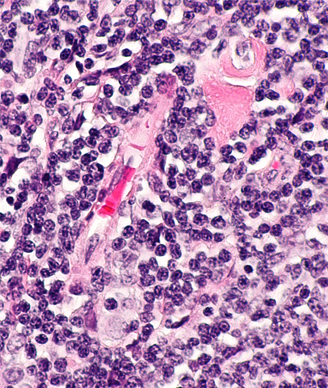Epcoritamab Produces Positive Responses in R/R Follicular Lymphoma
Investigators of the phase 1/2 EPCORE NHL-1 trial plan to discuss their findings with global regulatory authorities to determine the next steps for epcoritamab in the treatment of relapsed/refractory follicular lymphoma.
The FDA approved epcoritamab for treating relapsed/refractory DLBCL and high-grade B-cell lymphoma in May 2023.

The investigational bispecific antibody epcoritamab-bysp (Epkinly) yielded responses exceeding the protocol prespecified threshold for efficacy among pretreated patients with relapsed/refractory follicular lymphoma, according to a press release on topline results from the phase 1/2 EPCORE NHL-1 trial (NCT03625037).1
In the study’s follicular lymphoma cohort, treatment with epcoritamab led to an overall response rate (ORR) of 82% per independent review committee assessment. Additionally, the median duration of response (DOR) was not reached in responders.
Epcoritamab produced no unexpected safety signals at the time of the analysis. The most common treatment-emergent adverse effect (TEAE) was cytokine release syndrome, which occurred in 66.4% of patients, with 1.6% of patients having grade 2 or higher events. Investigators are assessing alternative step-up dosing schedules that may help mitigate the possibility of CRS; early findings among the first patients enrolled on the study suggest a meaningful improvement in CRS incidence.
Investigators plan to present data from the follicular lymphoma cohort and findings from the optimization portion of the study at a future medical congress. Additionally, they look to discuss their findings with international regulatory agencies.
“These topline results are encouraging for patients [with relapsed or refractory follicular lymphoma] who are in need of new therapeutic options,” Jan van de Winkel, PhD, chief executive officer at Genmab, said in the press release. “We look forward to sharing the full results from this study cohort at an upcoming medical congress and discussing the results with global regulatory authorities.”
In the open-label, multi-center phase 1/2 EPCORE-NHL 1 trial, investigators assessed subcutaneously administered epcoritamab among patients with relapsed/refractory CD20-positive mature B-cell non-Hodgkin lymphoma, including follicular lymphoma. The trial consists of 3 portions: a first-in-human phase 1 dose escalation portion, a phase 2 escalation portion, and an optimization portion evaluating potential alternative step-up dosing regimens to limit grade 2 CRS and minimize the risk of grade 3 or higher CRS.
The primary end points included dose-limiting toxicities and AEs in the escalation portion, ORR in the expansion portion, and incidence of CRS in the optimization portion. Secondary end points included DOR, complete response (CR) rate, progression-free survival, duration of CR, and time to response based on Lugano criteria.
Patients 18 years and older with documented CD20-positive mature B-cell neoplasm including but not limited to follicular lymphoma, diffuse large B-cell lymphoma (DLBCL), high-grade B-cell lymphoma, or primary mediastinal large B-cell lymphoma were eligible for enrollment on the trial. Additional eligibility criteria included having an ECOG performance status of 0 to 2; measurable disease by CT, MRI, or CT-PET scan; acceptable liver function; and acceptable renal function.
Patients with primary central nervous system (CNS) lymphoma or CNS involvement by lymphoma at screening were unable to enroll on the trial. Patients were also unsuitable for enrollment if they had clinically significant cardiovascular disease or received any prior therapy with an investigational agent targeting CD3 and CD20.
The FDA approved epcoritamab for treating relapsed/refractory DLBCL and high-grade B-cell lymphoma in May 2023.2 Supporting data for the approval came from the EPCORE NHL-1 trial. In the relapsed/refractory DLBCL cohort, epcoritamab yielded an ORR of 61% (95% CI, 53%-69%), including CRs in 38% of patients. With a median follow-up of 9.8 months, the estimated median DOR was 15.6 months (95% CI, 9.7-not reached).
References
- Genmab and AbbVie announce positive topline results from phase 1/2 EPCORE™ NHL-1 trial evaluating epcoritamab (DuoBody® CD3xCD20) in patients with relapsed/refractory follicular lymphoma (FL). News release. Genmab and AbbVie. June 28, 2023. Accessed June 28, 2023. https://shorturl.at/mtyNV
- FDA grants accelerated approval to epcoritamab-bysp for relapsed or refractory diffuse large B-cell lymphoma and high-grade B-cell lymphoma. News release. FDA. May 19, 2023. Accessed June 28, 2023. bit.ly/45j0zeg
Highlighting Insights From the Marginal Zone Lymphoma Workshop
Clinicians outline the significance of the MZL Workshop, where a gathering of international experts in the field discussed updates in the disease state.